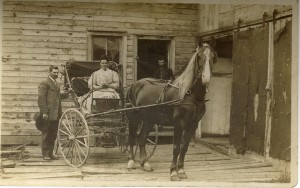January 14, 2010
Ahhh. A friend asked me this question recently. I’ve heard it from family members, too. And it has happened to me.
 So, first, don’t take it personally. It feels hard not to because we use communication to regulate conversation, and we have learned cues that signal it is our turn, like the other person stops talking. When we haven’t stopped talking and someone interrupts us, it feels rude. We feel devalued. What? You don’t want to hear what I have to say??
So, first, don’t take it personally. It feels hard not to because we use communication to regulate conversation, and we have learned cues that signal it is our turn, like the other person stops talking. When we haven’t stopped talking and someone interrupts us, it feels rude. We feel devalued. What? You don’t want to hear what I have to say??
Second, realize that time constrains a doctor. It is frustrating for us to wait in the waiting room. Then we wait in the exam room. Finally, the doctor appears. Then we seem to get about 10 minutes if we are lucky. Truth is that a doctor works for an organization. Even if it is the doctor’s organization or practice with a couple of others, it is an organization that has employees and must manage its resources–the doctor’s time in this case. A certain number of patients need to be seen to satisfy the organization. So the doctor really does not have the luxury to spend more time with you…unless an emergency necessitates it.
Third, ask yourself, are you telling a story as a way to tell the doctor why you are there? A story about how we were gardening all weekend and then we noticed a thorn seemed to be lodged in our finger and then we tried to get it out but it now seems to be infected even after we washed it really well and kept it covered in antibiotic ointment for the past several days… Or a story about how we have been doing a lot of traveling for our job and it all began with the downturn in the economy and so in the past month we have spent more days on the road than at home and suddenly, we’ve noticed a sharp pain at the back of our knee. Or the one about how between our job and our family–with a lot of details built in–there is just no time to exercise.
Fourth, if you are telling a story, stop. The reason you are there is: an infected finger, pain in the back of your leg, an annual check-up and help to lose weight. See how much more concise that is? Then if the doctor has questions, elaborate. But again, come to the point.
Fifth, be direct about what you want as well. If you haven’t read Deborah Tannen’s book, You Just Don’t Understand: Women and Men in Conversation, it’s worth reading. Some of the lessons to be learned apply to talking with our doctors. There is an example about saying, “the trash is full” in hopes that a spouse will know to empty it and feeling frustrated when the trash doesn’t get emptied. “Please empty the trash” is the more direct approach and more likely to lead to success. A story about how your friend has acne and her blemishes are not as bad as yours and her doctor prescribed such and such…still may not generate the doctor’s answer to your question, “Why aren’t you prescribing such and such?” In the age of internet searches for medical information, perhaps there is a list of things you think the doctor might do and none of them happens. So, ask about it in a straightforward way. No, you don’t need to tell about how you were googling the news and came upon a story about someone’s condition that sounded just like yours so you started paying more attention to your symptoms and it seemed like you should come and get checked out. Just say, “I have these symptoms and I wondered if such and such might help.” Doctors know we are using the internet to get medical information. It is no surprise to them. Sometimes, they are really happy about it. Other times, not so much.
It’s a start. See if it works.
 January 21, 2010
January 21, 2010
 January 19, 2010
January 19, 2010


 January 12, 2010
January 12, 2010 January 10, 2010
January 10, 2010 January 4, 2010
January 4, 2010